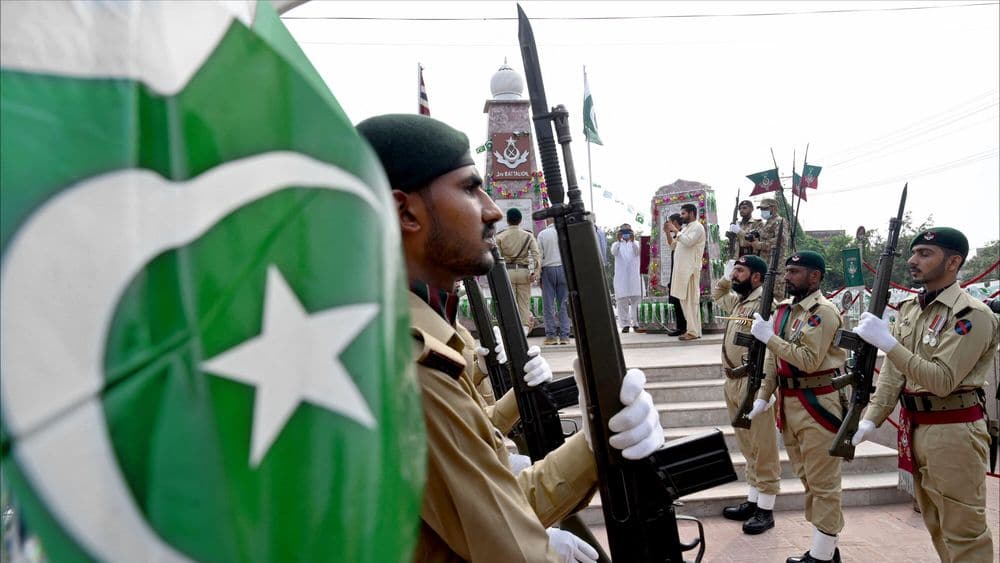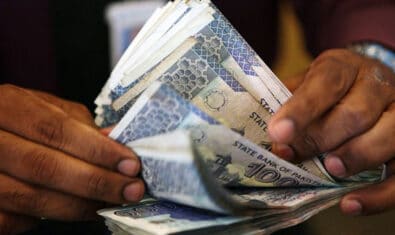By Dr. JH Raza
A lesson modern history has taught us well is that it neither forgets nor forgives leaders who talk peace with a gun in their hand. Sadly, history does, however, seem to turn a blind eye to the gaslighting – to use modern parlance – that seems to go hand in hand with this type of leadership style.
Pakistan is just one nation that has borne the brunt of this novel form of statesmanship. A nation which has fought and, many would argue, been instrumental in the defeats of both communism and terrorism – global phenomena, largely caused by US foreign policy – – is yet again being cast as a pariah by the leader of the very nation with whom they stood shoulder to shoulder in these two gargantuan 20th century battles.
The cost in lives of military personnel and civilians in both these wars is a bitter and poignant testament to the diligence with which Pakistan has stood by its international commitments to make the world ‘a safer place’ (more for others, sadly, than for ourselves). Add to that the trillions expended or lost as a result of our unfailing support for the wars of others, surely we deserve more than the regular opprobrium we seem to get from our erstwhile allies.
US President Joe Biden citing Pakistan as the world’s most dangerous nation, therefore, while not surprising, is yet another example of blame transference at its finest. If this is what modern statesmanship looks like, then we are in for a rough ride.
And, while we’re on the subject, why is it that our neighbours in India, who have actually lost missiles or ‘accidentally’ fired them into Pakistan are not subjected to the same levels of criticism as their Muslim counterparts in Pakistan. I’ll leave that thought here to fester and for the reader to make up their own mind about this stark double standard.
Sadly, the nations – like Pakistan – that are most frequently censured are the ones who were plundered and left destitute by the same nations who now rule the world. The very prosperity of countries like the United States was built on plunder and the systematic destruction of entire civilisations, leaving the survivors of genocide to rebuild from scratch.
Nations, like individuals, have long memories. Our collective consciousness and knowledge of the history of previous interactions inevitably colours our dealings with others: and if the past is anything to go by we have a great deal to worry about.
Throughout history, exposure to the global north has been little short of catastrophic for citizens of the global south. The list of calamities visited is endless. For example, we all know of the Atlantic Slave Trade in which whole populations were hunted like animals, brutally shackled and transported across vast oceans to be enslaved on plantations where they were forced to work under the most appalling conditions so that their masters could get rich from the sweat and blood of their labours. Then there are the South American civilisations who were plundered and systematically made extinct all because the conquerors coveted their fabulous wealth. The descendants of those so cruelly brutalised by Europeans and North Americans still rue the day these European colonisers landed on their shores and, even now, revile the names of the very heroes who ‘discovered‘ them.
The effects of colonisation – the looting of wealth and resources and the systematic destruction of whole civilisations – are being felt into the modern era. Had those nations not been stripped of everything, who can tell how far they would have advanced in comparison to the wealthier nations of today.
Even the recent floods in Pakistan can be laid at the doorsteps of those plundering nations whose carbon emissions are destroying the planet. And while they talk of how climate change is the new global challenge and how developing nations need to do more, they forget that they are the authors of their own doom – and, perhaps more disgracefully, the doom of others. Paying lip service to climate change awareness is not enough. Rather than criticising others, Western leaders would do better to put their own houses in order – if not for us, then consider it self-motivated altruism. By supporting the developmental aspirations of others they will only be helping themselves. Not a bad outcome, on balance.
Pakistan is not dangerous as Mr Biden so glibly stated to his acolytes in Washington. Pakistan is, however, jaded by years of double dealing and hypocrisy. The lack of cohesion the President spoke of exists not because we are careless with our nuclear assets, but because we have been careless in understanding the lessons from history. That is no longer the case and the President would do well to remember that in this time of international flux when strategic alliances are shifting and the world order is changing.
And yet, we are blamed today for the effects of the injustices that were done to our ancestors by the very same people who committed those injustices. If cohesion is lacking, then, I humbly submit it is not in our ability (or otherwise) to protect our nuclear assets, but in the leaders of the Western world who ignore their own excesses which have led to our need to even have a nuclear capability. It’s not too far-fetched to say that the resource-led conflicts in developing countries of today are a direct result of the depredations of the past by the now developed nations. So, please, Mr Biden, understand history and point the finger where it’s most deserved. At yourself, not at us!
About the Author
Dr Jibran Hussain is an adjunct professor at the Public Policy Institute (RIPHAH), Quaid-e- Azam University, and other leading Pakistani Universities.



























Forget about what Biden says, imran is disqualified! Hallelujah
Happiest day for Pakistan. As a Pakistani, I can believe Jinnah’s dreams are alive.
Pakistan not safe till ex pm supporters are eliminated
An excellent abstract of the historic perfidiousness of our so called allies. Its high time for our political leadership to stop playing minions to the Western overlords whose extrication of us is blatantly manifest as soon as they have acquired their required services from us.